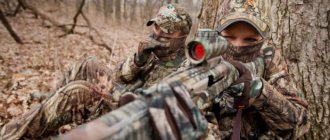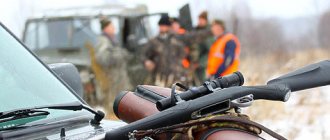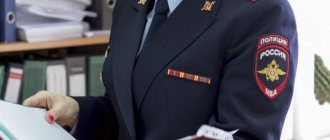1. Illegal hunting, if this act is committed:
a) causing major damage;
b) using a mechanical vehicle or aircraft, explosives, gases or other methods of mass destruction of birds and animals;
c) in relation to birds and animals, hunting of which is completely prohibited;
d) in a specially protected natural area or in a zone of environmental disaster or in a zone of environmental emergency, -
shall be punishable by a fine in the amount of up to five hundred thousand rubles, or in the amount of the wages or other income of the convicted person for a period of up to two years, or by correctional labor for a term of up to two years, or by imprisonment for a term of up to two years.
2. The same act, committed by a person using his official position, or by a group of persons by prior conspiracy or by an organized group, or which caused especially large damage, -
shall be punishable by a fine in the amount of five hundred thousand to one million rubles, or in the amount of the wages or other income of the convicted person for a period of three to five years, or by imprisonment for a term of three to five years, with deprivation of the right to hold certain positions or engage in certain activities for a term of up to three years or without it.
Note. In this article, large damage is recognized as damage calculated according to the rates and methodology approved by the Government of the Russian Federation, exceeding forty thousand rubles, especially large - one hundred twenty thousand rubles.
Commentary to Art. 258 of the Criminal Code of the Russian Federation
1. The direct object of the crime is relations for the protection and rational use of wild animals.
The following types of hunting are permitted in Russia: commercial, sport, amateur, hunting for the purpose of carrying out research and educational activities, regulating the number of hunting resources, acclimatization, relocation and hybridization of hunting resources, their maintenance and breeding in semi-free conditions or artificially created habitats, ensuring the traditional way of life and carrying out traditional economic activities of indigenous peoples of the North, Siberia and the Far East of the Russian Federation (Article 12 of the Law on Hunting).
The special regulations that regulate hunting primarily include: Laws on hunting and wildlife; Order of the Ministry of Natural Resources of Russia dated November 16, 2010 N 512, approved. Hunting rules on the territory of the Russian Federation, regulatory legal acts of the constituent entities of the Russian Federation, for example. Fast. Government of the Tula Region dated July 29, 2014 N 381 “On the introduction in the territory of the Tula Region of restrictions and prohibitions on the use of hunting resources in the summer-autumn period of 2014, the autumn-winter period of 2014 - 2015, the spring period of 2015 and the summer period of 2015” .
According to Part 5 of Art. 23 of the Law on Hunting, the types of permitted hunting and the parameters for its implementation in the relevant hunting grounds are determined by the highest official of the constituent entity of the Russian Federation (the head of the highest executive body of state power of the constituent entity of the Russian Federation).
2. The subject of the crime is hunting resources - objects of the animal world that, in accordance with the Law on Hunting and (or) the laws of the constituent entities of the Russian Federation, are used or can be used for hunting purposes. In accordance with Art. 11 of the Law on Hunting these include:
- mammals: a) ungulates - wild boar, musk deer, wild reindeer, roe deer, elk, red deer, fallow deer, chamois, hybrids of bison with bison and livestock, etc.; b) bears; c) fur-bearing animals - wolf, jackal, fox, corsac fox, arctic fox, wolverine, badger, martens, sable, minks, otters, squirrels, hamsters, muskrats, etc.;
- birds - geese, ducks, geese, wood grouse, black grouse, hazel grouse, partridges, pheasants, snowcocks, snipe, snipe, pigeons, turtle doves, etc.
In order to ensure the traditional way of life and the implementation of traditional economic activities of the indigenous peoples of the North, Siberia and the Far East of the Russian Federation, loons, cormorants, skuas, gulls, terns, and common birds are also classified as hunting resources. The laws of the constituent entities of the Russian Federation allow mammals and (or) birds not provided for in Parts 1 and 2 of Art. to be classified as hunting resources. 11 of the Law on Hunting.
Hunting for wild animals belonging to species listed in the Red Book of the Russian Federation and (or) protected by international treaties of the Russian Federation, the circulation of such animals (including their parts and derivatives) is allowed only in exceptional cases provided for by environmental legislation (for example, for conservation of fauna, monitoring the state of their population, regulating their numbers, protecting public health, eliminating threats to human life, protecting agricultural and other domestic animals from mass diseases, ensuring the traditional way of life and carrying out traditional economic activities of indigenous peoples of the North, Siberia and the Far East of the Russian Federation), on the basis of permits (administrative licenses) obtained in the prescribed manner, and in compliance with the conditions stipulated therein (clause 13.1 of the Post. Plenum of the Armed Forces of the Russian Federation dated October 18, 2012 N 21).
Taking possession of animals kept in cages, enclosures, fenced areas, zoos, circuses or in the possession of citizens is classified as theft of someone else's property, and shooting or killing such animals and birds in any other way (if there are signs of composition) is considered as intentional or careless destruction of someone else's property. property (Articles 167, 168 of the Criminal Code of the Russian Federation).
3. The objective side of the crime consists in carrying out illegal hunting in the presence of at least one of the conditions specified in paragraphs “a” - “d” of part 1 of the commented article.
Hunting in violation of the requirements of the legislation on hunting is illegal, including hunting without the appropriate permit for the extraction of hunting resources, outside designated areas, outside the timing of the hunt, for birds and animals other than those specified in the permit, or in quantities not specified. , prohibited instruments or methods, etc.
Hunting is recognized as activities related to the search, tracking, pursuit of hunting resources, their extraction, primary processing and transportation (Clause 5 of Article 1 of the Law on Hunting). Part 2 of Art. 57 of the Law on Hunting and departmental regulations equate to it being in hunting grounds with guns, dogs, birds of prey, traps and other hunting tools, with hunted products, as well as with assembled hunting firearms and on public roads. For example, A.’s presence in hunting grounds with a weapon in a case was equated to hunting. ——————————— See: BVS RF. 2004. N 34. P. 14.
However, based on the definition of hunting given in the Hunting Law, it seems that recognizing it as a crime for a person with a weapon to be on the territory of a hunting ground is an overly broad interpretation of the concept of hunting. These actions can only be regarded as preparation for a crime, but by virtue of Part 2 of Art. 30 of the Criminal Code, they are not criminally punishable, since illegal hunting is not one of the grave and especially grave crimes. Only administrative measures can be applied (Article 8.37 of the Administrative Code).
The Plenum of the Armed Forces of the Russian Federation began to adhere to a similar opinion, which in paragraph 14 of the Post. dated 10/18/2012 N 21 explained that “the objective side of the administrative offense provided for in Part 1 of Article 8.37 of the Code of Administrative Offenses of the Russian Federation is a violation of hunting rules, i.e. requirements for hunting and conservation of hunting resources throughout the Russian Federation, in particular the presence of individuals in hunting grounds with hunting tools and (or) hunting products, hunting dogs, birds of prey without the appropriate permit. Such actions are subject to qualification under Part 1 of Article 8.37 of the Code of Administrative Offenses of the Russian Federation if they do not contain signs of a crime under Article 258 of the Criminal Code of the Russian Federation.”
A legal hunter, i.e. A person entitled to hunt is recognized as an individual whose information is contained in the state hunting register, or a foreign citizen temporarily staying in the Russian Federation and having entered into an agreement for the provision of services in the field of hunting. An employee of a legal entity or individual entrepreneur who performs duties related to hunting and preserving hunting resources on the basis of an employment or civil law contract is considered a hunter.
The hunter must have a hunting license (except for foreign citizens) and permission to store and carry hunting weapons.
The certificate for the right to hunt is (depending on the type of hunting and the category of the hunter) as a general rule, a permit for the extraction of hunting resources issued to the hunter, a voucher (a document confirming the existence of an agreement on the provision of services in the field of hunting). For commercial, amateur and sport hunting in publicly accessible hunting grounds within the meaning of Art. Art. 13 - 14 of the Law on Hunting, only a permit is sufficient, although it is obvious that conducting commercial hunting without a preliminary conclusion of an agreement is hardly possible. In any case, the main document is the permit. It indicates: information about the hunter; type of hunting; information about extracted hunting resources; their number; dates and places of hunting. The procedure for issuing permits is specified in Order of the Ministry of Natural Resources of Russia dated August 29, 2014 N 379 “On approval of the procedure for registration and issuance of permits for the extraction of hunting resources, the procedure for filing applications and statements necessary for the issuance of such permits, and approval of forms of permits for the extraction of ungulates and bears , fur-bearing animals, birds."
Permits are issued to: hunters in designated hunting areas - by the relevant legal entity or individual entrepreneur who has entered into hunting agreements; in publicly accessible hunting grounds - by the executive authority of the constituent entity of the Russian Federation; in specially protected natural areas - by the relevant environmental institutions; employees of individual entrepreneurs and legal entities - these entrepreneurs and legal entities; legal entities and individual entrepreneurs on the basis of hunting agreements concluded by them - by government bodies within the limits of their powers (Article 31 of the Law on Hunting). By Order of the Ministry of Natural Resources of Russia dated March 31, 2010 N 93 approved. sample form of a hunting agreement.
The permit is valid only in the place indicated therein and on the specified dates and periods, which cannot exceed the duration of the hunting season.
Hunting without a proper permit or with an expired permit, by someone other than the person to whom the permit was issued, or who received the permit without the necessary grounds through illegal means, is recognized as being carried out without a permit. The signs of such hunting also include the hunting of animals or birds in excess of the norm established in the permit, or of species (breeds) other than those for which the permit was issued, or in violation of the terms specified in the permit or in places other than those specified in the permit.
Places prohibited for hunting include the territories of nature reserves, wildlife sanctuaries, green zones around cities and other populated areas, areas of industrial enterprises, transport routes, as well as other places prohibited by relevant acts of senior officials of the constituent entities of the Russian Federation (usually indicated in the appendices to the hunting rules) .
Prohibited periods for hunting are times when all hunting is prohibited, or periods prohibited for the extraction of certain types of hunting resources. They are set in relation to local conditions.
Prohibited tools and methods of hunting are set out in the Rules of hunting on the territory of the Russian Federation dated November 16, 2010 N 512 and the rules approved. relevant acts of senior officials of the constituent entities of the Russian Federation.
For example, when hunting, it is prohibited: shooting while in (on) a mechanical vehicle or aircraft, with the exception of shooting while in a watercraft with the engine turned off and which has stopped moving due to inertia after the engine is turned off; the use of long-barreled hunting firearms with a rifled barrel and rifled barrels of combined hunting firearms for hunting game birds; the use of smooth-bore hunting firearms for hunting game birds, equipped with shot (buckshot) larger than 5 mm and bullets; the use of semi-automatic weapons with a magazine capacity of more than five cartridges in collective hunting for the extraction of game animals; the use of service weapons, with the exception of hunting in order to regulate the number of hunting resources; other weapons not classified in the established order as hunting weapons, with the exception of bows and crossbows for carrying out research and preventive work related to the immobilization and injection of objects of the animal world; the use of pneumatic hunting weapons, with the exception of hunting squirrels, flying squirrels, chipmunks, doves, hazel grouse, crows (gray, black and large-billed) in case the latter are classified as hunting resources by the laws of the constituent entities of the Russian Federation, as well as for carrying out research and preventive work, associated with immobilization and injection of animal objects.
Mechanical vehicles and aircraft (clause “b” of part 1 of the commented article) should be understood as cars, motorcycles, motor scooters, snowmobiles, boats, motor boats and other vehicles driven by an engine. An aircraft may include airplanes, helicopters and any other aircraft in accordance with Part 1 of Art. 32 VZK.
A person can be found guilty of illegal hunting committed with the use of a mechanical vehicle or aircraft only if they were used to search for animals, track them or pursue them for the purpose of production, or they were used directly in the process of their production (for example, shooting birds and animals were removed from the vehicle while it was moving), and illegally obtained animals were also transported. The use of these means to deliver people or hunting tools to the hunting location does not constitute hunting using a mechanical vehicle or aircraft. These actions, if there are grounds for it, can be qualified as complicity in illegal hunting in the form of complicity (clause 10 of the Post. Plenum of the Armed Forces of the Russian Federation dated October 18, 2012 N 21).
For example, G. was sentenced on this basis to imprisonment with confiscation of his car as an illegal hunting weapon. However, the materials of the case indicated that G. caught the elk by shooting it with a hunting rifle, and used the car only as a means of moving to the illegal hunting area. In this case, recognizing the car as an instrument of crime is unfounded, and its confiscation is illegal. ——————————— BVS RSFSR. 1977. N 4. S. 15 - 16.
Methods of mass extermination of birds and animals (clause “b” of part 1 of the commented article) are actions associated with the use of explosives, gases or shooting fires, the use of nets, the construction of trapping pits and pens. When resolving the question of whether a crime was committed by means of the mass destruction of birds and animals, one should take into account not only the prohibited type of weapon or method of production, but also establish whether their use can lead to the mass destruction of animals. In necessary cases, it is advisable to involve relevant specialists or experts in studying the properties of such tools or the mining methods used (clause 11 of the Post. Plenum of the Armed Forces of the Russian Federation dated October 18, 2012 N 21).
A complete prohibition (clause “c” of Part 1 of the article under comment) means a prohibition to carry out all types of hunting for certain types of birds and animals at any time of the year due to their special value. First of all, this concerns the hunting of birds and animals listed in the Red Book of the Russian Federation. For example, hunting sika deer, bison, leopard, snow leopard, polar bear, flamingo, stork, and cranes is completely prohibited. At the same time, this concept is conditional, since, as stated above, in exceptional cases provided for by environmental legislation, hunting for scientific, educational purposes, for maintaining the traditional way of life of the peoples of the North and in other cases is permitted.
The procedure for issuing permits for the circulation of wild animals belonging to species listed in the Red Book of the Russian Federation is determined by the Law on Hunting and is specified in the Post. Government of the Russian Federation dated January 6, 1997 N 13 “On approval of the Rules for obtaining objects of the animal world belonging to species listed in the Red Book of the Russian Federation, with the exception of aquatic biological resources.” General requirements for the protection of rare and endangered animals (along with the requirements for the protection of the same plants and other organisms) are set out in Art. 60 of the Law on Environmental Protection.
It should, however, be borne in mind that according to paragraph “c” of Part 1 of the commented article, it is necessary to qualify illegal hunting in relation to birds and animals listed in the Red Book of the Russian Federation or the Red Book of a subject of the Russian Federation and (or) protected by international treaties of the Russian Federation, but not included in the List of especially valuable wild animals and aquatic biological resources belonging to species listed in the Red Book of the Russian Federation and (or) protected by international treaties of the Russian Federation, for the purposes of Art. Art. 226.1 and 258.1 of the Criminal Code (approved by the Resolution of the Government of the Russian Federation of October 31, 2013 N 978). In the case of illegal hunting in relation to birds and animals included in the specified List, the act must be qualified under the relevant part of Art. 258.1 of the Criminal Code (clause 13.2 of the Post. Plenum of the Armed Forces of the Russian Federation dated October 18, 2012 N 21).
For the concepts of “specially protected natural area”, “zone of environmental disaster” and “zone of environmental emergency”, see the commentary to Art. 262 and 247.
The crime (with the exception of illegal hunting that caused major damage) has been completed since the beginning of actions directly aimed at searching, tracking, pursuing for the purpose of obtaining hunting resources, as well as their extraction, primary processing, and transportation. The corpus delicti is formal.
When deciding whether the damage caused by illegal hunting is large, it is necessary not only to proceed from the number and value of the animals caught, damaged and destroyed, but also to take into account other circumstances of the act, in particular the ecological value of the animal, its significance for a particular habitat, population size of these animals. In particular, the damage caused by the illegal hunting of elk, red deer (deer, wapiti), musk ox, brown and white-breasted (Himalayan) bear should be considered large (clause 9 of the Post. Plenum of the Armed Forces of the Russian Federation of October 18, 2012 N 21).
To recognize the crime as completed in this case, it is necessary to cause real damage and to have a causal connection between the act and the consequence. The corpus delicti is material. If a person, while engaged in illegal hunting, due to circumstances beyond his control, was unable to achieve results, the act constitutes an attempt at illegal hunting on the basis of major damage.
The cost of animals when calculating damage is determined according to special taxes, approved. Government of the Russian Federation. The current rates are for calculating the amount of damage caused to hunting resources, approved. as an appendix to the Order of the Ministry of Natural Resources of Russia dated December 8, 2011 N 948 “On approval of the Methodology for calculating the amount of damage caused to hunting resources.”
4. From the subjective side, the crime is committed with direct intent.
5. The subject of the crime is a general person - a sane individual who has reached the age of 16 at the time of the commission of the crime.
6. The use by a person of his official position (Part 2 of the article under comment) as a qualifying element of a crime is understood as the use for illegal hunting of the rights and powers that the person is endowed with through his service or work, for example. employees of state hunting control and supervision bodies, heads of organizations or other legal entities engaged in commercial hunting, hunting management bodies, representatives of the executive administration. Here the subject of the crime is special.
7. For the concepts of a group of persons by prior conspiracy and an organized group, see the commentary to Art. 35. It should be borne in mind that only persons who searched, tracked, pursued and extracted hunting resources, carried out their primary processing and (or) transportation are recognized as perpetrators of the crime. Members of a group of persons by prior conspiracy who did not directly participate in illegal hunting, but contributed to the commission of this crime with advice, instructions, provision of hunting tools, vehicles, as well as purchasing, storing or selling products of illegal hunting on a promise given in advance, are subject to criminal liability as accomplices with reference to Part 5 of Art. 33 of the Criminal Code, provided that they were reliably aware of the illegality of hunting (clause 12 of the Post. Plenum of the Armed Forces of the Russian Federation of October 18, 2012 N 21), and members of an organized criminal group, as follows from generally accepted practice, under Part 2 of Art. 258 of the Criminal Code without reference to Part 5 of Art. 33 of the Criminal Code (clause 17 of the Post. Plenum of the Supreme Court of October 18, 2012 N 21).
8. The distinction between a crime (Article 258 of the Criminal Code of the Russian Federation) and an administratively punishable violation of hunting rules (Part 1 of Article 8.37 of the Code of Administrative Offenses) is carried out on the basis of such criteria as causing major damage, the use of a mechanical vehicle or aircraft, explosives, gases or other methods mass destruction of birds and animals, committing an act in relation to birds and animals, the hunting of which is completely prohibited, or in a specially protected natural area, in an environmental disaster zone or in an environmental emergency zone (clause 14 of the Resolution of the Plenum of the Supreme Court of October 18, 2012 N 21).
What is poaching
“Poaching” is industrial fishing, recreational fishing, deforestation, plant collection, and hunting that violates environmental laws. Carefully study the current information about rare species, prohibited methods and territories at the time you are going hunting or fishing. Information may be updated and changed.
What is the fine for?
Let's figure out why a fine is charged and what you should pay special attention to.
- Don't forget about hunting permits. Their absence during the hunt will be considered a violation of the law.
- Remember the closing and opening dates of the hunting season, this also applies to prohibitions for anglers during fish spawning.
- Study the lists of rare animals, the shooting and capture of which is prohibited by law. Remember about animals listed in the Red Book.
- Update information annually on standards and quotas for shooting or capturing animals.
What should you be prepared for?
The hunting inspector will check:
- compliance with hunting rules and its parameters;
- availability of a hunting license;
- availability of a voucher;
- availability of permission to hunt and to carry and store hunting weapons.
For non-compliance with the rules and regulations of hunting or fishing, administrative and criminal liability is provided.
Judicial practice: sentences and punishment under Art. 258 of the Criminal Code of the Russian Federation
- Resolution of the Plenum of the Supreme Court of the Russian Federation dated... PLENARY OF THE SUPREME COURT OF THE RUSSIAN FEDERATION DECISION dated December 27, 2002 N 29 ON JUDICIAL PRACTICE IN CASES OF THEFT,...
- Decision of the Supreme Court: Determination N 203-APU17-21... THE SUPREME COURT OF THE RUSSIAN FEDERATION Case No. 203-APU17-21 APPEAL DECISION Moscow August 31, 2022 Judicial Collegium for Military Personnel of the Supreme...
- Resolution of the Plenum of the Supreme Court of the Russian Federation dated... PLENARY OF THE SUPREME COURT OF THE RUSSIAN FEDERATION DECISION of November 15, 2016 N 48 ON THE PRACTICE OF APPLICATION BY COURTS OF LEGISLATION GOVERNING FEATURES...
- Resolution of the Plenum of the Supreme Court of the Russian Federation dated... PLENAUM OF THE SUPREME COURT OF THE RUSSIAN FEDERATION DECISION dated June 25, 2022 N 18 ON JUDICIAL PRACTICE IN CASES OF CRIMES,...
- Decision of the Supreme Court: Resolution No. 310P13 dated... DECISION OF THE PRESIDIUM OF THE SUPREME COURT OF THE RUSSIAN FEDERATION Case No. 310-P13 Moscow January 23, 2014 Presidium of the Supreme Court of the Russian Federation...
- Resolution of the Plenum of the Supreme Court of the Russian Federation dated... PLENAUM OF THE SUPREME COURT OF THE RUSSIAN FEDERATION DECISION dated December 17, 2022 N 43 ON SOME ISSUES OF JUDICIAL PRACTICE IN CASES...
- Judicial Collegium for Criminal Cases, appeal:... THE SUPREME COURT OF THE RUSSIAN FEDERATION Case No. 72-APU 17-21 APPEAL DECISION Moscow October 04, 2022 Judicial Collegium for Criminal Cases...
- Resolution of the Presidium of the Supreme Court of the Russian Federation dated... PRESIDIUM OF THE SUPREME COURT OF THE RUSSIAN FEDERATION DECISION dated December 5, 2018 N 126-P18 ON RESUMING PROCEEDINGS IN THE CASE DUE TO NEW...
- Ruling of the ECtHR dated 02/14/2017 EUROPEAN COURT OF HUMAN RIGHTS THIRD SECTION CASE “MASLOVA VS. RUSSIAN FEDERATION” (Complaint No. 15980/12) JUDGMENT…
- Decision of the Supreme Court: Determination No. 38-АПУ17-2 dated... THE SUPREME COURT OF THE RUSSIAN FEDERATION No. 38-АПУ17-2 APPEAL DECISION Moscow March 1, 2022 Judicial Collegium for Criminal Cases of the Supreme Court...
Administrative liability for violation of hunting rules
Violation
of hunting rules :
- Fine: 500-4,000 rubles, confiscation of weapons or deprivation of the right to hunt for up to 2 years is also possible (Article 8.37 Part 1).
- Fine for persons holding positions: 25,000-35,000 rubles, possible confiscation of weapons.
Repeated violation
of hunting rules
:
- Fine: 4,000-5,000 rubles, possible confiscation of weapons or deprivation of the right to hunt for up to 1-3 years (Article 8.37, Part 1.1).
- Fine for officials: 35,000-50,000 rubles, possible confiscation of weapons.
Violation of hunting deadlines and hunting with unauthorized types of weapons
:
- For citizens: deprivation of the right to hunt for up to 1-2 years (Article 8.37, Part 1.2).
- For officials, fine: 35,000-50,000 rubles, possible confiscation of weapons.
Failure to provide travel voucher, permit or license
:
- For citizens: deprivation of the right to hunt for up to 1-2 years (Article 8.37, Part 1.3).
- For officials, fine: 25,000-40,000 rubles, possible confiscation of weapons.
Violation of the rules for using objects of the animal world
:
- For citizens: 500-1,000 rubles, confiscation of weapons is possible (Article 8.37 Part 3).
- For officials: 2,500-5,000 rubles, possible confiscation of weapons.
- For legal entities: 50,000-100,000 rubles, possible confiscation of weapons.





